沪教牛津版 七年级英语下 教案.doc
- 格式:doc
- 大小:36.00 KB
- 文档页数:3
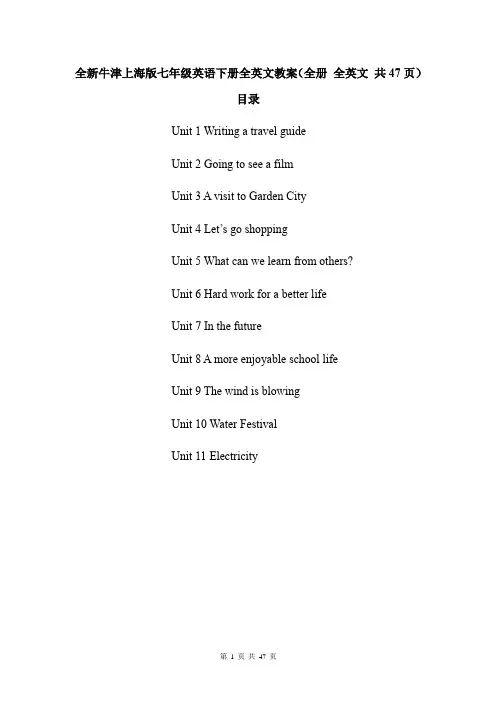
全新牛津上海版七年级英语下册全英文教案(全册全英文共47页)目录Unit 1 Writing a travel guideUnit 2 Going to see a filmUnit 3 A visit to Garden CityUnit 4 Let’s go shoppingUnit 5 What can we learn from others?Unit 6 Hard work for a better lifeUnit 7 In the futureUnit 8 A more enjoyable school lifeUnit 9 The wind is blowingUnit 10 Water FestivalUnit 11 ElectricityUnit 1 Writing a travel guide1教学目标By the end of the lesson, the Sts will…be able to further practise describing a place and know more about Shanghai.be able to develop their speaking ability of fluency by describing a scenic spot.2学情分析The learners are the students form Class Twelve, Grade Seven of North Jincai Secondary School. They have been learning English for 7 years, so they are of different levels. Quit e a few students are quite excellent. They do well in both speaking and writing. They are very active in class. But some students are at a lower English level. However, sometime s they can speak a little in class. What they need is a language environment. Therefore, g roup work in class is helpful for them to take an active part in the class.3重点难点This is ‘more practice’ part of Module One. The topic is A One-day Tour Plan. We have talked about some famous places in the previous period, so the students have learned so me expressions. There will be a language environment created for them so as to encourag e more of them to talk about scenic spots and their tour plans.Key phrases and sentence structures are familiar to students. But it will be a little hard fo r them to organize language with much new information. So teacher can take fully advant age of group work. The students may have difficulty in listening to the French in the sec ond part because of the accent. Teachers can give students a second chance to listen.Some students may also have difficulty in pronouncing some words. Teachers can guide them t o use the dictionaries on their Pads.4教学过程第一学时教学目标By the end of the lesson, the S ts will…be able to further practise describing a place and know more about Shanghai.be able to develop their speaking ability of fluency by describing a scenic spot.学时重点This is ‘more practice’ part of Module One. The topic is A One-day Tour Plan. We have talked about some famous places in the previous period, so the students have learned so me expressions. There will be a language environment created for them so as to encourag e more of them to talk about scenic spots and their tour plans.学时难点Key phrases and sentence structures are familiar to students. But it will be a little hard fo r them to organize language with much new information. So teacher can take fully advant age of group work. The students may have difficulty in listening to the French in the sec ond part because of the accent. Teachers can give students a second chance to listen.Some students may also have difficulty in pronouncing some words. Teachers can guide them t o use the dictionaries on their Pads.教学活动活动1【导入】Lead inIt’s said that th ey really enjoyed the trip to Shanghai. Do you want to know where they have been? I will show you some pictures of places they’ve been. Please take notes when you are watching.T gives the following instructions:1. I will show you some pictures of places they’ve been.2. Please take notes when you are watching.3. After that, please tell me how many places are there altogether and what they are.T shows four pictures of some places.S answers according to the picture.T corrects the mistakes and may show the pictures again if necessary.(Pudong International Airport, the bund, Yu garden, Shanghai zoo, Xintiandi, Shanghai Sci ence and Technology Museum and Shanghai Museum)活动2【活动】Input-listeningT: Among these pictures, do you know their favourite place?Students may give some answers or no answer.T: I’ve invited 4 French students to talk about their favourite places. Let’s listen to them. Please take notes while listening.T plays the recording one by one.T invites students to give answers and give reasons.T gives feedback if the students’ answers are wrong.活动3【活动】Input-readingT: French students told me that they wanted to know more about Shanghai, about those t hey have been to, and also about those they haven’t. Would you please give them some i ntroductions about more places? First, you need to read some instructions.T gives the instructions.1. Work in a group of 6.2. Each group needs to read 8 passages and find useful information as much as possible.3. Take notes and finish the table.4. Group A is responsible for sightseeing, Group B shopping and Group C eating.T provides individual drilling.活动4【活动】Output-an introduction about a scenic spotT invites some students to introduce some scenic spots according to the information they have taken down.T gives feedbacks about their presentations.活动5【活动】Output-a tour planT: I think they will enjoy those places. So why not make a tour plan for them? Please d iscuss with your group members and make a one-day tour plan for them. Each group nee ds to focus on your task. (Group A sightseeing Group B eating Group C shopping.)T provides individual drilling.T invites some students to give presentations about their tour plans.T gives feedbacks about their presentations.活动6【作业】AssignmentT: Write down your 3-day tour plan for French students. The school may use your plan next year.e.g.: On the first day, they are going to …Unit 2 Going to see a film1教学目标认知目标:课标词汇hardly, type, operate, railway, fly, judge, raise, instruction, program, mistake, hold, video, more importantly, have great understanding of…, make mistakes, for the time being拓展词汇unaware, be unaware of…, dependent, be dependent on…,diagram,essential, drive, CD-ROM, DVD-ROM2. 能力发展目标:1)通过多种形式的阅读活动与任务,培养一些阅读微技能,如:整体把握文章大意,快速搜索信息的能力2)设计小组合作,学会交流与合作3)情感目标:拓展学生视野,培养学生正确表达自己观点,学会对电影做出评价2学情分析1.这是一篇影评,比较枯燥,学生容易失去兴趣。
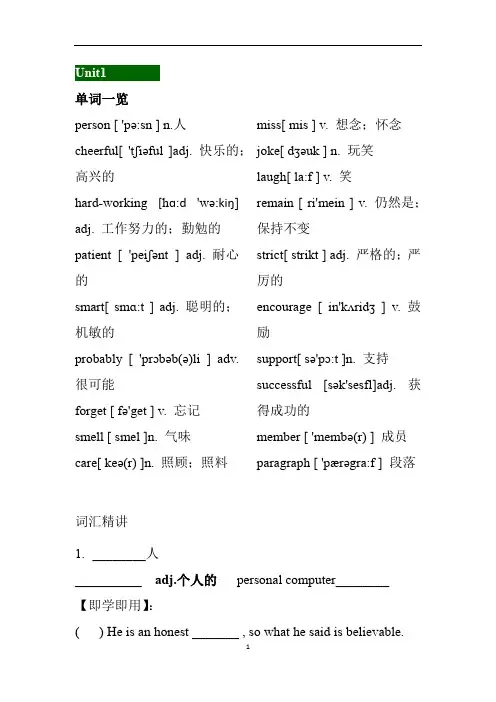
Unit1单词一览person [ 'pə:sn ] n.人cheerful[ 'tʃiəful ]adj. 快乐的;高兴的hard-working[hɑ:d 'wə:kiŋ] adj. 工作努力的;勤勉的patient [ 'peiʃənt ] adj. 耐心的smart[ smɑ:t ] adj. 聪明的;机敏的probably [ 'prɔbəb(ə)li ] adv. 很可能forget [ fə'get ] v. 忘记smell [ smel ]n. 气味care[ keə(r) ]n. 照顾;照料miss[ mis ] v. 想念;怀念joke[ dʒəuk ] n. 玩笑laugh[ la:f ] v. 笑remain [ ri'mein ] v. 仍然是;保持不变strict[ strikt ] adj. 严格的;严厉的encourage [ in'kʌridʒ ] v. 鼓励support[ sə'pɔ:t ]n. 支持successful [sək'sesfl]adj. 获得成功的member [ 'membə(r) ] 成员paragraph [ 'pærəgra:f ] 段落词汇精讲1.________人__________ adj.个人的personal computer________ 【即学即用】:( ) He is an honest _______ , so what he said is believable.A. childrenB. smellC. jokeD. person2.快乐的高兴的(adj) _____________ = ______________ 【同根词】_______ n & v高兴;使振奋【固定搭配】:cheer up________ *cheerleader___________Cheerleaders’ task(任务) is to cheer up players._________________________________________________ _____●Yellow is a _________________ (cheer) color.●She is a happy girl. She is always __________________(cheerful / sad).【即学即用】:()1. --- He has many friends, so he always looks cheerful.--- Yes, he really is.A. sadB. worriedC. happy()2. Tom is a _______ student. So he does well in his lessons.A. cheerfulB. tallC. hard-workingD. lazy3. (1) __________ adj. 耐心的_______ n. 耐心【固定搭配】:be patient with sb _______________________(2) ________ n.病人The doctor is patient with his patients.Mr Oliver is very_____________ (patience).5. _____ adj.聪明的= ___________比较级: ______________ 最高级______________●At present, everyone is playing smart phone on thesubway.●He likes to ask himself “Am I smarter? ”6.___________ adv.很可能= ___________【同根词】:adj. _________You’re ____________ (probable) right.—“Will it be a sunny day tomorrow?”—“Probably not.”7.________ v.忘记(过去式)________(过去分词)___________【反义词】:___________forget的短语:forget to-v / forget v-ing(1) forget to do sth.表示“______________”(未做)Don’t forget to turn off (关闭)the light when you leave.(2) forget doing sth表示“_______________”(已做)He forgot watering (浇花) the flowers.思考:remember to v 与remember v-ing●remember to do sth.表示________________________________________●remember doing sth.表示_________________________________________【即学即用】:●( )Don’t forget an umbrella you.It’s going to rain.A. to take; toB. taking; toC. to take; withD. take; with●I forgot _______ (close) the door, so I went back to have alook.●Remember ______ home to see your grandparents usually.8.____________ n.气味;v.闻;闻起来①作名词,意为“气味”。
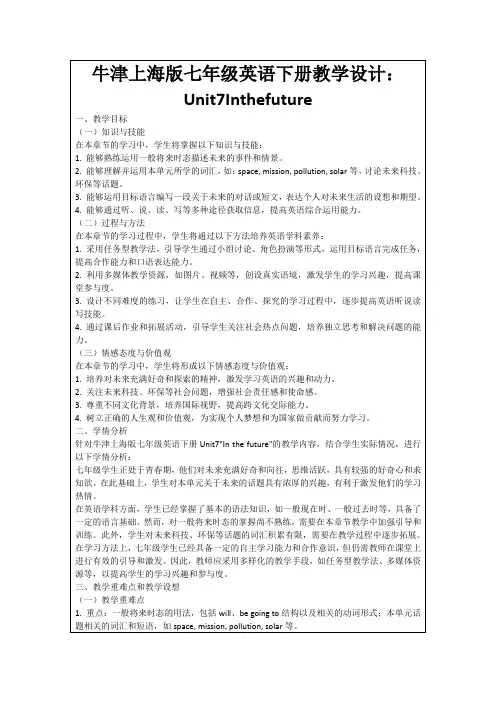
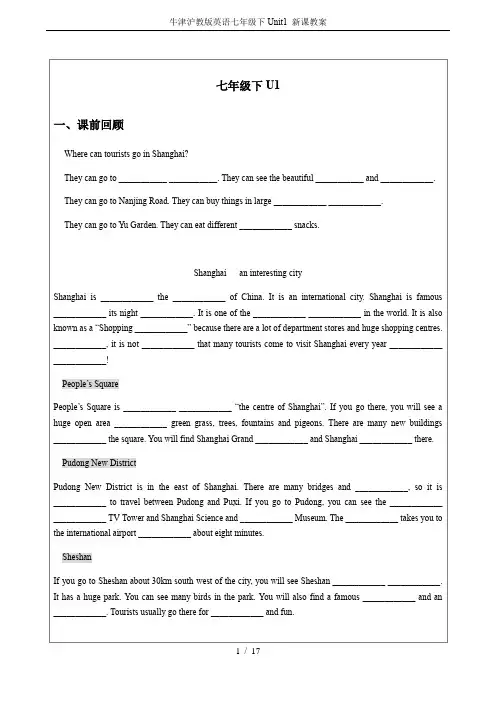
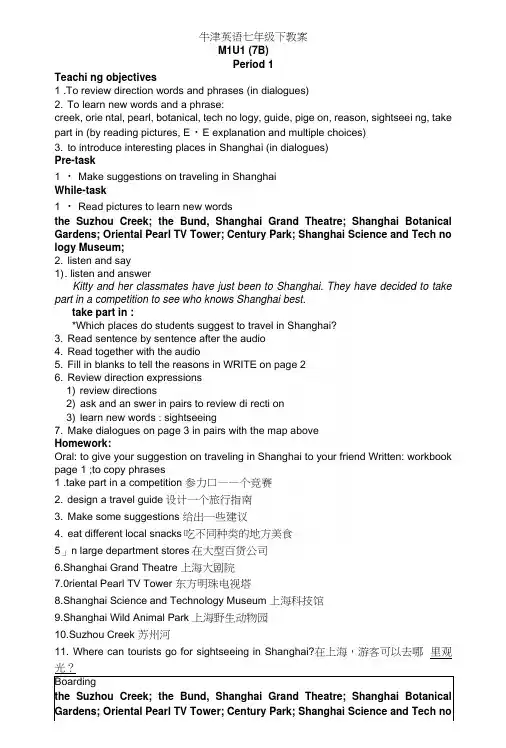
牛津英语七年级下教案M1U1 (7B)Period 1Teachi ng objectives1 .To review direction words and phrases (in dialogues)2. To learn new words and a phrase:creek, orie ntal, pearl, botanical, tech no logy, guide, pige on, reason, sightseei ng, take part in (by reading pictures, E・E explanation and multiple choices)3. to introduce interesting places in Shanghai (in dialogues)Pre-task1 ・ Make suggestions on traveling in ShanghaiWhile-task1 ・ Read pictures to learn new wordsthe Suzhou Creek; the Bund, Shanghai Grand Theatre; Shanghai Botanical Gardens; Oriental Pearl TV Tower; Century Park; Shanghai Science and Tech no logy Museum;2. listen and say1) . listen and answerKitty and her classmates have just been to Shanghai. They have decided to take part in a competition to see who knows Shanghai best.take part in :*Which places do students suggest to travel in Shanghai?3. Read sentence by sentence after the audio4. Read together with the audio5. Fill in blanks to tell the reasons in WRITE on page 26. Review direction expressions1) review directions2) ask and an swer in pairs to review di recti on3) learn new words : sightseeing7. Make dialogues on page 3 in pairs with the map aboveHomework:Oral: to give your suggestion on traveling in Shanghai to your friend Written: workbook page 1 ;to copy phrases1 .take part in a competition 参力口——个竞赛2. design a travel guide设计一个旅行指南3. Make some suggestions 给出一些建议4. eat different local snacks吃不同种类的地方美食5」n large department stores在大型百货公司6.Shanghai Grand Theatre 上海大剧院7.0riental Pearl TV Tower 东方明珠电视塔8.Shanghai Science and Technology Museum 上海科技馆9.Shanghai Wild Animal Park 上海野生动物园10.Suzhou Creek 苏州河11. Where can tourists go for sightseeing in Shanghai?在上海,游客可以去哪里观光?Boardingthe Suzhou Creek; the Bund, Shanghai Grand Theatre; Shanghai Botanical Gardens; Oriental Pearl TV Tower; Century Park; Shanghai Science and Tech nology Museum;M1U1 (7B)Period 2Teachi ng objectives1 .To review di recti o n words and phrases (in dialogues)2. To learn new words and a phrase:creek, oriental, pearl, bota nical, tech no logy, guide, pige on, reas on, sightseei ng, take part in (by reading pictures, E・E explanation and multiple choices)3. to introduce interesting places in Shanghai (in dialogues)Pre-task1. listen and reviewWhile-taskI ・ Learn new phrases in situation and consolidate by making examplesbe famous for; be known as2. learn new words and phrases by reading picturesnight view; shopping paradise; district; Maglev; state; resort; observatory 3. learn new words in E-E explanationget on well with4. read silently and answer questions for the first paragraph;5. answer questions to complete the second paragraph;6. read paragraph 3 silently and do True or False; retell according True or False7. read paragraph 4 silently and answer questions; explainHomeworkOral: recite paragraph 1 +2/3/4; read the leftWritten: workbook page 4,5; copy words and phrases: 词汇:1. therefore 因此adv.词组:2. an observatory 一个天文台3. get on with 进展4. be famous for night views 以夜景而著名5. be known as被认为…;誉为…6. a shopping paradise 购物天堂7. one of the largest cities 最大的城市之一8. a huge open area with green grass——片巨大的开放的绿土也9. Pudong New District 浦东新区10. go there for sightseeing and fun 去那里观光游乐句子:II ・ How are you getting on with your travel guide?你们的旅行指南进展怎样T?12. Ifs convenient to travel between Pudong and Puxi.在浦东和浦西之间通行很方便。
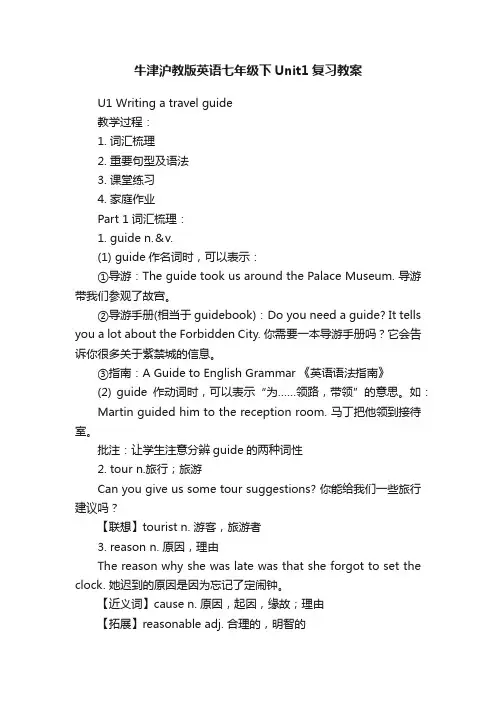
牛津沪教版英语七年级下Unit1复习教案U1 Writing a travel guide教学过程:1. 词汇梳理2. 重要句型及语法3. 课堂练习4. 家庭作业Part 1词汇梳理:1. guide n.&v.(1) guide作名词时,可以表示:①导游:The guide took us around the Palace Museum. 导游带我们参观了故宫。
②导游手册(相当于guidebook):Do you need a guide? It tells you a lot about the Forbidden City. 你需要一本导游手册吗?它会告诉你很多关于紫禁城的信息。
③指南:A Guide to English Grammar 《英语语法指南》(2) guide作动词时,可以表示“为……领路,带领”的意思。
如:Martin guided him to the reception room. 马丁把他领到接待室。
批注:让学生注意分辨guide的两种词性2. tour n.旅行;旅游Can you give us some tour suggestions? 你能给我们一些旅行建议吗?【联想】tourist n. 游客,旅游者3. reason n. 原因,理由The reason why she was late was that she forgot to set the clock. 她迟到的原因是因为忘记了定闹钟。
【近义词】cause n. 原因,起因,缘故;理由【拓展】reasonable adj. 合理的,明智的批注:the reason why的句可以让学生用在写作中。
3. take part in 参加(活动)如:We’ll take part in the sports meeting this Friday. 本周五我们要参加运动会。
They have decided to take part in a competition. 他们决定参加一个竞赛。
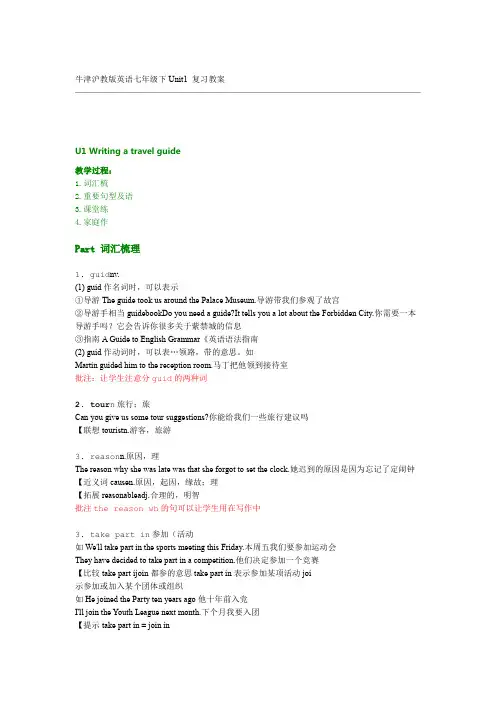
牛津沪教版英语七年级下Unit1 复习教案U1 Writing a travel guide教学过程:1.词汇梳2.重要句型及语3.课堂练4.家庭作Part 词汇梳理1. guid nv.(1) guid作名词时,可以表示①导游The guide took us around the Palace Museum.导游带我们参观了故宫②导游手相当guidebookDo you need a guide?It tells you a lot about the Forbidden City.你需要一本导游手吗?它会告诉你很多关于紫禁城的信息③指南A Guide to English Grammar《英语语法指南(2) guid作动词时,可以表…领路,带的意思。
如Martin guided him to the reception room.马丁把他领到接待室批注:让学生注意分guid的两种词2. tour n旅行;旅Can you give us some tour suggestions?你能给我们一些旅行建议吗【联想touristn.游客,旅游3. reason n.原因,理The reason why she was late was that she forgot to set the clock.她迟到的原因是因为忘记了定闹钟【近义词causen.原因,起因,缘故;理【拓展reasonableadj.合理的,明智批注the reason wh的句可以让学生用在写作中3. take part in参加(活动如We'll take part in the sports meeting this Friday.本周五我们要参加运动会They have decided to take part in a competition.他们决定参加一个竞赛【比较take part ijoin都参的意思take part in表示参加某项活动joi示参加或加入某个团体或组织如He joined the Party ten years ago他十年前入党I'll join the Youth League next month.下个月我要入团【提示take part in = join in批注:注take part injoi的区4. sightseeingn观光;游Tourists usually go there for sightseeing and fun游客们通常会去那儿观光游玩【记忆go sightseein去观【联想go shoppin去购物go swimmin去游泳go fishin去钓鱼go travellin去旅游11/ 1复习教案牛津沪教版英语七年级下Unit1去徒步旅行go boating去划船;go hiking go camping去野营;go cycling去骑车;去打猎go windsurfing去风帆冲浪;go hunting go skating去溜冰;观光旅游 a sightseeing tour【拓展】a sightseeing bus观光旅游车的中部位于……5. in the centre ofin the middle of 强调与四周距离相等的中心位置,常用来指空间;【比较】in the centre of强调两端之间的位置,并不强调中心,既可用于指空间,也可用于指时间。
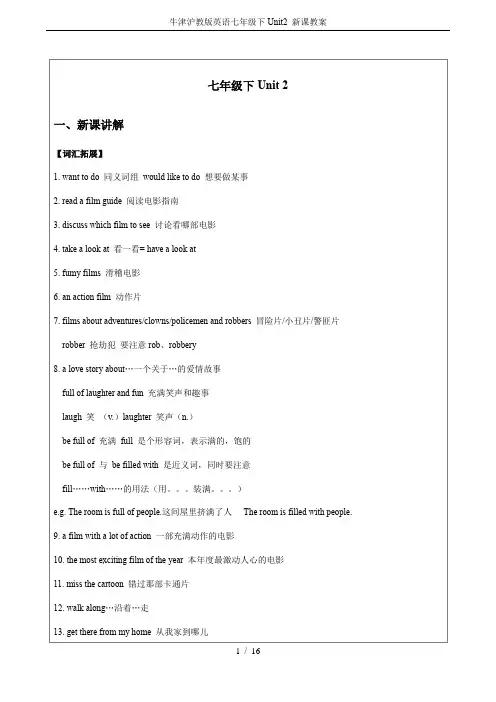
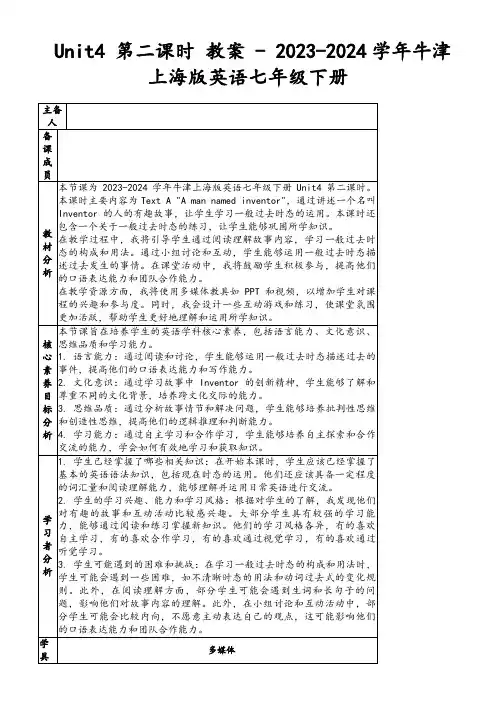
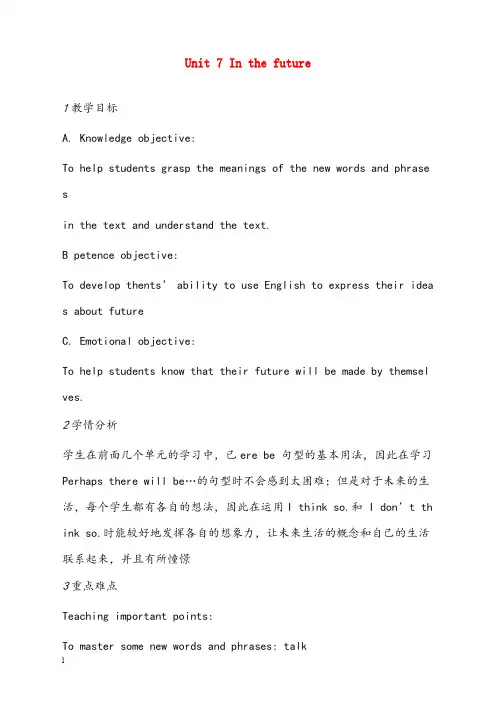
Unit 7 In the future1教学目标A. Knowledge objective:To help students grasp the meanings of the new words and phrase sin the text and understand the text.B petence objective:To develop thents’ ability to use English to express their idea s about futureC. Emotional objective:To help students know that their future will be made by themsel ves.2学情分析学生在前面几个单元的学习中,已ere be 句型的基本用法,因此在学习Perhaps there will be…的句型时不会感到太困难;但是对于未来的生活,每个学生都有各自的想法,因此在运用I think so.和 I don’t th ink so.时能较好地发挥各自的想象力,让未来生活的概念和自己的生活联系起来,并且有所憧憬3重点难点Teaching important points:To master some new words and phrases: talkabout, be able to, planet, space station, pill ,meal,take pills for mealsTo learn the sentence pattern:What do you think will happen in the future?Perhaps people will (not) be able to … / Perhapsthere will (not) be…/I think so./ I don’t think so. Teaching difficult points:Understand the nd learn to communicate with others in proper En glish expressions.4教学过程第一学时教学活动活动1【导入】Pre-task preparationAsk the students to listen to a song A Bright Tomorrow in My He art.Talk abe song and ask students if they think so to lead in the new lesson.A. People will have robots in space stations.B. People won’t take pills for meals.C. There will be books only on computer,not on paper.D. There will not be enough food for everybody.E. People will be able to live on other planets.教师通过播放歌曲使课堂气氛活跃起来,课堂教学活动能顺利进行,课堂气氛也会变得生动活泼,和谐轻松.活动2【活动】While-task procedure教师活动Ask the stude listen to the text and answer the question: What do they think will happen in the future?预设学生行为Listen to the text on page 44 and follow the tapeLook at theres and complete the sentences about life in the fut ure.Talk about fe in the future with the pictures given. Practice t he followingdialogue:Listen to an interview about life in the future onthe moon and tell whether the statements are True or False设计意图整个这个环节是本堂课的重要环节,通过对课文的听、说、读以及判断正误的进行,学生对课文的重点知识有了循序渐进的熟悉和理解。
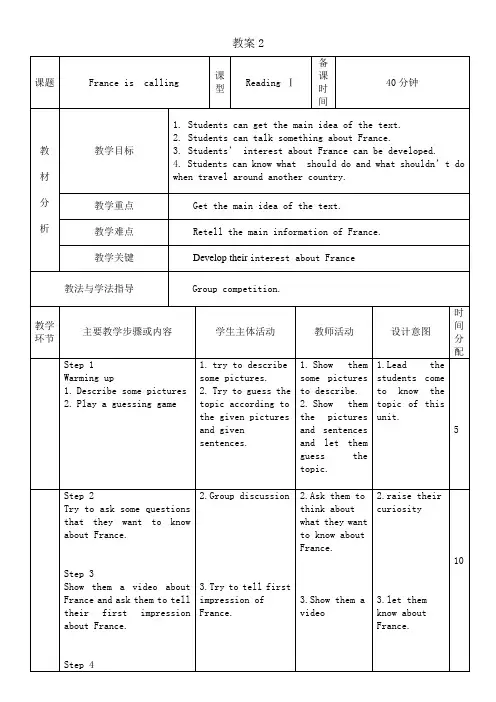
Unit 3 Our animal friends 教案课题:Unit 3 Our animal friends课型:Reading 课时:第 1 课时,共 4 课时教学目标1.Students can master how to pronounce the new words and master the meanings of the words .2.Let students know more about dogs.3.To master some usages of some useful expressions and develop an ability of howto get a further understanding of the text.4.Develop the reading ability and speaking skills教学重点: Know the structure and contents of the main article教学难点: Imagine the use of dogs. Find out more helpful animals in our daily life.教学准备: PPT, Blackboard教学步骤:Step I: Pre-reading1.Show a picture of a dog to arouse the interest and lead them to get into thetopic of this unit.a)Do you like dogs?b)Dogs are our friends.They help us a lot.2.Talk about the kinds of dogs in groups.3.Finish Exercise A on Page 30.A.Match the kinds of dogs in the box with the pictures below.4.Talk about the following questions and help the students answer them.a)What does a police dog do?b)What does a rescue dog do?c)What does a guide dog do?Step II: While-reading Procedure1.Look at the photos and the title of the story on page 31. Then answer the questions below. a)What do you think the word “ eyes ” means in the story?b)What is the story probably about?2.Read the text quickly and let the students get the general idea of the text.3.Read the first three paragraphs and answer the questions.a)Did the receptionist want to allow Charlie to stay in the hotel? Why or why not?b)What is Charlie?c)What did the receptionist do then?4.Read the last two paragraphs and complete the chart.5.Learn some new words and help them understand main words.Step III:Discussion1.Students work in groups and discuss the following question.How do dogs save people ?2.Encourage the students to given their possible answers.Step IV: Reading comprehension.Read the text in details and finish the blank filling exercise in a sheet, then check the answers. Step V: Sum upStep VI:Homework1.Read the text fluently2 write a passage to introduce your favorite animal.Step VII:The blackboard design课题:Unit 3 Our animal friends课型:Language points and grammars课时:第 2 课时,共 4 课时教学目标1. Students can understand and remember the main points.2. Students can master the grammars R eflexive pronouns a nd Preposition of position.3.Students can do some exercises about them.教学重点: Language Points教学难点:The grammars Reflexive pronouns a nd Preposition of position. 教学准备: PPT, Blackboard, music教学步骤:Step I: RevisionReview some main vocabulary.b.Retell the text in own words.c.Listen to the radio programme and finish A and B on Page 34.Step II: Group worka.Ask the students to collect the language points as much as possible in the text.b.Which group collect the most?Step III:. Language points learning.1.Explain main language points.2.Help the students make sentences with them to understand them better.3.Practice the language points to finish A and B on Page 34.4.Finish D1 on Page 33.Step IV: Grammars learning.Grammar A Reflexive pronouns1.Show PPT for them to understand what Reflexive pronoun s is.2.Encourage them to make sentences to help them understand.3.Find the sentences about R eflexive pronoun s in the text.4.Master the rule about Singular Reflexive pronoun a s n d Plura l Reflexive pronoun s.5.Finish the given exercises on Page 36.Grammar B Preposition of position.1.Show PPT for them to understand Preposition of position.2.Encourage them to make sentences to help them understand.3.Find the sentences about P reposition i.n the text.4.Finish the given exercises on Page 37.Step V: Practice the grammarsanize them to finish the exercise about the grammars in limited time .2. check the answers.Step VI: Sum upa.Know about Reflexive pronouns and Preposition..a.Show a PPT to guide the students to give sum up of the class.b..Help them to cultivate the ability of summarizing.Step VII.Homework:Make a dialogue in written way to talk about how a dog help people Step VIII. The blackboard designUnit3 Our animal friends课题: Unit 3 Our animal friends 课时: 第3课时共4课时课型: Reading 教学目标:1. Students can talk about dolphins.2. Students can get the main idea about T he Friendly Dolphin. 教学重点: Know more about friendly dolphins. 教学难点: Get the main idea about the story.教学准备: PPT, Blackboard教学方法: Group competition. 教学步骤:Step I:. Revision.a.Review the main language points.b.Review the grammars R eflexive pronouns a nd Preposition of position..Step II: Lead in.1.Show three pictures.Ask:a.What animals can you see in these pictures?b.Do you like them?c.What do you know about them? Can they save people' s lives?Step III:.Before reading1.Invite them to look at the pictures of sharks and dolphins.2.Answer the questions:What do you think of sharks and dolphins?Step IV:While readinga.Get the main idea of the story The Friendly Dolphin.b.Can talk about how a dolphin saved his life.c.Finish the given exercise on Page 40.d.Ask the students to note the tips.Step V: Group worka.In groups, role-play a press conference with the boy in the story.b.One student can be the boy saved by the dolphin, the other students can be journalists asking questions about the story.Step VI: Sum upStep VII:. Homework:Finish the exercises in this unit on your workbook.StepVIII: The blackboard designUnit3 Our animal friends课题: Unit 3 Our animal friends 课时: 第 4 课时,共 4 课时课型: Writing 教学目标:1.The students can talk about dogs laws.2.Students can write some sentences on helpful animals .3.Students should be ready to help others.. 教学重点: Talk about dogs laws. 教学难点: Write out the sentences about helpful animals..教学准备: PPT, Blackboard教学步骤:Step I: Before writing1.Read the culture corner about the dog laws in the UK.2.Answer the two questionsa.What must dogs wear in public places in the UK? Why?b.What kind of dogs needn' tt follow this law?c.Talk about the dog laws in our country.Step II:.Writing.a.Show a picture of animals on a farm.b.Choose one of the animals and talk about how it helps people.c.Write an article about it. Use the following words and the sentences to help you. Step III:Discussiona.Show a picture of animals.b.What animal do you like best?c.What is special about this animal?d.Why do you like this animal?e.Is this animal helpful to people?Step IV:Show time1.Walk around to find the better work to show around.2.Correct the work and recommend the better one to learn from. Step V: Sum up1.List the beautiful sentences they write in the passages2.Sum up some skills in writingStep VI: HomeworkRewrite the article in the exercise book.Step VII:. The blackboard designUnit 3 Our animal friends。
2015-2016学年牛津沪教版初中英语七年级下册精品教案Unit 1 People around us一、教材分析本单元围绕着“人”的话题来展开听、说、读、写的训练。
Reading A以三位学生谈论他们身边熟悉的人,帮助学生了解如何进行描写身边的以及常用句式。
作为初中一年级的学生,规范地向别人描述人是一种必备的能力,也是认识及评价人的一种重要手段。
语法方面讲述定冠词the的用法,并培养学生在描述人中如何正确使用定冠词。
具体课型、课时安排如下:二、教学对象分析1.学生升入中学已有一学期,已经基本适应了初中的学习,通过对人进行描述,让学生学会描述人并对身边的人进行初步评价,有利于开展本单元的听、说、读、写任务。
2.学生在小学阶段就已经接触过了定冠词the的用法,本单元再通过系统地复习,在学习方式上引导学生学习归纳总结。
三、单元教学目标1.认知目标:2. 思想情感目标:1)通过谈论“身边的人”的相关话题,帮助学生如何描述人并对身边的人作出适当的评价。
2)结合课文的内容,引导学生如何对身边的人作出评价作谨慎交友。
3. 能力发展目标:1)能够在听、说、读、写等语言综合实践活动中运用本单元的重点词汇、句型与语法。
2)在学习中提高交流和传递信息的能力,在写作中正确运用连词使文章更连贯和流畅。
3)通过指导学生在模拟交际中运用所学的知识,培养学生探究学习、合作学习、自主学习的能力。
四、单元教学重点1. 学生熟练掌握重点词语,词组及句型。
2.指导学生利用所学句型正确表达思想、进行交际活动。
3.指导学生归纳、总结定冠词the的用法,并在实践运用中熟练运用。
4. 指导学生巩固写人的基本方法。
五、单元教学难点1. 如何进行描述人。
2. 定冠词the的归纳整理及运用。
六、教学策略1. 引导学生积极主动的通过预习完成可以自己学会的部分,课堂学习完成学习的重难点,通过复习及归纳总结完善单元的学习。
2. 在教学中以旧带新,引导学生用正确的句子表达思想。
i7B Unit8 From hobby to careerDate: July _______ , 2013重点单词Career Knowledge不可数n•知识Decide决定planet Lively adj.生动的trainsatellite last alonediamond anybodyshoot achievehost sail重点词组in the future more and moreused to grow up 成长,长大go outside go sailinglook like重点句型详细讲解:2.Maybe you could become a PE teacher.或许你会成为一"名体育老师。
(pagell2) Maybe adv.或许,可语法一、used to的用法教材例句1.He used to look at the starts every night, but now he does not.2.1 didn't used to have much money.3.When did her dad used to take them for trips on his boat?语法全解used to表示“过去经常,以前常常”这是一个固定结构,它和其他情态动词的用法一样,to 后血接动词原形,而且没有人称和数的变化。
他表示过去常常做某事而现在已经不做了。
它只有一种形式,即过去式,可用于所有的人称。
Li Ming used to do his homework on Sundays, but now he often does his homework on Saturdays.I used to get up at half past six in the morning; now I usually get up at severu【拓展】used to的否定形式可以为used not to,也可以为didn't used to<.疑问句式也有两种: Did e to...?/ Used ...to...?二、when引导的时间状语从句教材例句1・ When she visits her friends, she always brings a presents.2.When I was eight, I got a book about starts.3.When the girl got older, she sailed the boat herself.语法全解1.When是一个连词,意为:"当.... 的吋候”,后面跟一个句子。
沪教牛津版七年级下册初中英语全册教案(教学设计)Unit 1 People around us 教案课题:Unit 1 --- People around us (阅读课)课时:第 1 课时,共4课时课型:new words教学目标:1.To know the meaning of the new words and the students can use the words to make sentences.2.To train the students’ ability o f cooperation.教学重点: The pronunciation and the usages of the new words: cheerful , hard-working , patient, person, smart, forget, smell , strict, encourage, remain , support successful, remember.教学难点: The usages of the new words: forget , remember , patient , strict, remain , strict.教学准备: e some pictures and games and PPT .2.a recorder .教学步骤:Step 1 Warming up. Freely talk:who do you like best around you ?show some pictures of teacher,father ,mother,friend, on the PPT to talk about them.Step 2 New words.1.Read the new words after the teacher or the tape.2.Group work to remember the new words3.Help the students when they have trouble in reading the new wordsStep 3 Key words learning.1.Show the PPT of the meaning of the key words for them to finish Part A1.2. Let Ss make more sentences with the new words .Step 4 Have a competitioncheck the words and give them marks for the groupsstep5 ReadingBefore reading : 1.Ask Ss to look at the pictures and the titles of the three articles on page 3.2.Check their answers.While reading : 1.Read the article quickly, and then finish Part D1.2. Check their answers.Post reading: 1.Ask Ss to finish Part C1 and C2.2. Check their answers.Step 6 Reciting the article1.Play the tape for them to listen and repeat.2.Show PPT for them to retell the article.ExercisesTo consulate the usages of the new wordsstep 7 SummaryGive them a piece of paper to write the words.Step 8 Homework1.Dictation2.correct the mistakesStep9 The blackboard designUnit 1 People around us1. be cheerful快乐2.as well 也3.take care of 照顾4.tell jokes 讲笑话5.make sb laugh 使某人发笑6.be good at 擅长于…7.be strict in sth 对某事严格要求be strict with sb对某人严格要求课题:Unit 1 People around us (听说课)课时:第2课时,共 4 课时课型:Listening & Speaking教学目标:1.Learn how to use the new words or phrases to describe a person2. improve their listening and speaking skills教学重点: To catch the missing words when listening教学难点: Learn to take note quickly when listening教学准备: Group work. Self—study教学步骤:Step 1: Prepare for the listening and speakingReview some words and phrases which can be used to describe a person Step 2: Do the listening1.Play the listening materials , stop when necessary2.Check the answersStep3.SpeakingGive a sample dialogue to students and ask them to imitate itStep 4:Make notes about the listening.1.Tell them to find the key words.2.Write down the key words you get in the listening part.Step5 Speaking1.学习双元音/iə/、/eə/、/uə/1)Read after the teacher or the tape.2)Read by themselves.2.Listen to the tape and finish A1 then check their answers.3.Learn A2. Ask Ss to read these sentences. Pay attention to the letters in red.4.Speaking upWork in groups to discuss the people they like .S1: Who do you like?S2: I like …S1: What does/did he/she look like?…Step6:Sum upStep7HomeworkStep8 The blackboard designUnit 1 People around us1.描写人的外貌的词2. 双元音/iə/、/eə/、/uə/课题:Unit 1 People around us(语法及运用课)课时:第3时,共 4 课时课型:Grammar教学目标:1.to grasp the usage of the definite word the and the preposition with2. to raise the students’ ability to sum up some language rules教学重点: Know when should use the in front of a noun and when we should not use it and the usage of the with phrases to describe a person教学难点: When we should not use the in front of a noun.教学准备:PPT, Blackboard教学步骤:Step1:Free talkTalk about the noun with an, a and the .Step2: WritingBefore writing: Give Ss the title of the article to talk about.1.Who are you going to write about?2.Think about the following ideas.1)a family member2)a good friend3)a teacher or a great personWhile writing:1.Write a short article about this person.Show some PPT to help them to write the article.2.介绍一些描述人常用的词汇.3. Ask Ss to re ad “My dad”as an example.Step3:More practiceAsk Ss to re ad the article about Mother’s Day quickly.Then answer the questions.1.When is Mother’s Day?2.What do people like to do this day?3.What do the author advise people to do on this day?Step4 Study skills1.Learn line graphs and bar charts to show the change in numbers.2.Fill in the blanks.3.Check their answers.Step 4:Culture corner1.Introduce middle names for Ss.2.Write some famous people’s middle names.Step5:Sum up1.Go over the rules of theStep6: HomeworkStep7 The blackboard design1.冠词“a\an”的用法。
牛津沪教版英语七年级下Un itl复习教案U1 Writ ing a travel guide教学过程:1. 词汇梳2. 重要句型及语3. 课堂练4. 家庭作Part词汇梳理1. guid nv.(1) guid作名词时,可以表示①导游The guide took us around the Palace Museum.导游带我们参观了故宫②导游手相当guidebookDo you need a guide?It tells you a lot about the Forbidden City. 你需要一本导游手吗?它会告诉你很多关于紫禁城的信息③指南 A Guide to English Grammar《英语语法指南⑵guid作动词时,可以表…领路,带的意思。
如Marti n guided him to the recepti on room. 马丁把他领到接待室批注:让学生注意分guid 的两种词2. tour n旅行;旅Can you give us some tour suggestions? 你能给我们一些旅行建议吗【联想touristn.游客,旅游3. reason n.原因,理The reason why she was late was that she forgot to set the clock. 她迟到的原因是因为忘记了定闹钟【近义词causen.原因,起因,缘故;理【拓展reasonableadj.合理的,明智批注the reason wh 的句可以让学生用在写作中3. take part in 参加(活动如We'll take part in the sports meeting this Friday.本周五我们要参加运动会They have decided to take part in a competition. 他们决定参加一个竞赛【比较take part ijoin都参的意思take part in表示参加某项活动joi示参加或加入某个团体或组织女口He joined the Party ten years ago 他十年前入党I'll join the Youth League n ext mon th.下个月我要入团【提示take part in = join in批注:注take part injoi 的区4. sightsee ingn 观光;游Tourists usually go there for sightseei ng and fun 游客们通常会去那儿观光游玩【记忆go sightsee in去观【联想go shoppin 去购物go swimmin 去游泳go fishin 去钓鱼go travellin 去旅游11/ 1复习教案牛津沪教版英语七年级下Unit1去徒步旅行go boating去划船;go hiking go camping 去野营;go cycling 去骑车;去打猎go windsurfing 去风帆冲浪;go hunting go skating 去溜冰;观光旅游 a sightseeing tour【拓展】a sightseeing bus观光旅游车的中部位于... 5. in the cen tre ofin the middle of强调与四周距离相等的中心位置,常用来指空间;【比较】in the centre of强调两端之间的位置,并不强调中心,既可用于指空间,也可用于指时间。
课题: Unit 7 Poems (运用与写作)课时: 第 4 课时,共 4 课时课型: Writing教学目标:To know how to write a passage about a kind of person教学重点: Should contain what do they do , what do you think of him or her?教学难点: How to describe his or her job教学准备: PPT, Blackboard教学步骤:Step 1 Free talk and preparation for writingAsk students to talk with your partner what kind of people impress you mostStep 2 Read the passage1.Help students to mark down the important points in the poem2.Fill in the blanks in P99Step3 Write1. Remind students to pay attention to their handwriting and check the mistakes students make2. List out a rundown and find some useful adjectives to describe the person you want to write Step 4 Reading and the translation1. Analyze and translate the poem.2. Discuss the question 4:☺When you were listening to the poem, did it make you feel something or think about something? What did it make you feel or think about?Look at the sample answer on screen.Step 5 Reading1.Read these two poems .2.Answer the questions on P100.Step 6 Presentation1.引导学生学习一下缩略词。